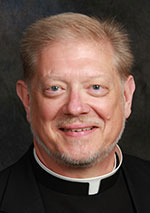That All May Be One / Fr. Rick Ginther
Make ‘resourcing’ of faiths part
of your summer
to-do list
 An old folk song is running through my head. “It’s summertime, summertime, sum-sum-summertime …” It beckons to memories of my youthful past, mixed with 21st-century technology. Curious?
An old folk song is running through my head. “It’s summertime, summertime, sum-sum-summertime …” It beckons to memories of my youthful past, mixed with 21st-century technology. Curious?
When I was a boy, summertime was about outdoor play, bicycling, mowing the lawn. But it was also about enjoying languid, hot summer days, curled up with a good book. And oh, how that irritated my younger brother! “Come on Richard, come out and play!”
But the book often won my attention. I was learning, even during the summer!
“You’re only as smart as your resources,” many of my teachers said over the years. Where shall you turn for knowledge, understanding and wisdom— good resources, rooted in history, updated, modern in form, imparting connection upon connection to fact, truth, and how to use wisely what one has learned?
This summer, I would encourage you to absent yourself for a while from the humidity and heat. Curl up with your laptop or tablet. Set aside the mind-numbing games you frequent online, the time-devouring distraction of surfing, and alight upon ecumenical and interreligious resources.
Set your browser to www.usccb.org, the official website of the U.S. Conference of Catholic Bishops (USCCB). Scroll down the home page to the directory of offices at the bottom. Click on “Ecumenical and Interreligious Affairs.” Witness the breadth and depth of 50 years of dialogue, outreach and cooperation.
Go to the “Ecumenical link” on the far left side of the page. Click on this to capture a brief definition, and links to video resources and print resources.
Browse down the list of ecumenical partners. Click on any one of them to uncover good information about the progress of dialogues and partners in the dialogues. Learn about each of the varied Christian Churches and ecclesial communities (e.g., the Greek Orthodox: who they are, how we are related in faith, how they relate to their own).
Further down, explore our interreligious partners: Islam, Buddhism, Sikhism, Hinduism. Gain for yourself a basic knowledge of each. How many believe in one God? How do they express that? What are the origins of these world religions?
And of course, connect to our Jewish brothers and sisters! Witness how committed we are to encounter the many expressions of Judaism, and their commitment to engage with us.
Finally, spend some time exploring the links at the bottom of the “Ecumenical and Interreligious Affairs” page.
There are Vatican resources: the Pontifical Council for Promoting Christian Unity, the Commission for Religious Relations with the Jews, the Pontifical Council for Interreligious Dialogue, and the Pontifical Council for Culture.
There is the national organization to which the archdiocese belongs, the Catholic Association of Diocesan Ecumenical and Interreligious Officers.
And our neighbors to the north, the Canadian Conference of Catholic Bishops Commission for Christian Unity, provides insight into another national conference of bishops working toward Christian unity. Finally, check out Religious Relations with the Jews, and Interreligious Dialogue.
Ah, summertime! Time to play. Time to relax. And time to learn—at home or on vacation! We can find so much to do, or not do.
I hope that some “resourcing” is a part of your summer and mine!
(Father Rick Ginther is director of the archdiocesan Office of Ecumenism. He is also dean of the Terre Haute deanery and pastor of St. Patrick and St. Margaret Mary parishes, both in Terre Haute.) †
 An old folk song is running through my head. “It’s summertime, summertime, sum-sum-summertime …” It beckons to memories of my youthful past, mixed with 21st-century technology. Curious?
An old folk song is running through my head. “It’s summertime, summertime, sum-sum-summertime …” It beckons to memories of my youthful past, mixed with 21st-century technology. Curious?